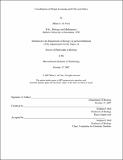Coordination of origin licensing and cell cycle entry
Author(s)
De Vries, Milan A
DownloadFull printable version (12.38Mb)
Other Contributors
Massachusetts Institute of Technology. Dept. of Biology.
Advisor
Stephen P. Bell.
Terms of use
Metadata
Show full item recordAbstract
The faithful duplication of the genome is a fundamental requirement for cellular propagation. To ensure successful transmission of genetic material to progeny, the preparation for, initiation, and completion of DNA replication are closely coordinated with cell growth. Central to this coordination is the regulated assembly and activation of the pre-Replicative Complex (pre-RC) at specific sites of future initiation, or origins of replication. In cycling cells, pre-RC formation can only occur in G1 when cyclin-dependent kinase activity is low, whereas activation of assembles pre-RCs can only occur as cells exit G1 and enter S-phase. The focus of my research has been investigating the parameters that regulate the selection of potential origins and their subsequent activation. My initial insights into the coordination between licensing and cell cycle progression came through the examination of origin usage during the first cell cycle as cells return to growth from quiescence. Surprisingly, I found that yeast retain a subset of pre-RCs at origins in G0. Although these origins are sufficient to duplicate the genome, additional pre-RCs are normally assembled as cells exit G0 and use of these additional licensed origins increases viability. Finally, this additional licensing is monitored by a checkpoint that is dependent on the Rad53 checkpoint kinase, but is distinct from other cellular surveillance mechanisms that Rad53 is involved in. I have gained further understanding of the control of origin usage through a genetic approach that identified novel factors that enhance the replication of weak origins. One factor that I investigated in more detail, acts by redistributing pre-RC formation amongst origins of replication. This perturbation of origin licensing appears to particularly affect replication when cells re-enter the cell cycle from quiescence, by perturbing the re-formation of pre-RCs.
Description
Thesis (Ph. D.)--Massachusetts Institute of Technology, Dept. of Biology, September 2008. This electronic version was submitted by the student author. The certified thesis is available in the Institute Archives and Special Collections. "October 17, 2007." Also issued printed in leaves. Includes bibliographical references.
Date issued
2008Department
Massachusetts Institute of Technology. Department of BiologyPublisher
Massachusetts Institute of Technology
Keywords
Biology.